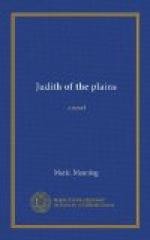Breakfast was already well under way when he reached camp. The outfit, seated on saddles in a semicircle about the chuck wagon, ate with that peculiar combination of haste and skill that doubtless the life of the saddle counteracts, as digestive troubles are apparently unknown among plainsmen. The cook, in handing Peter his tin plate, cup, spoon, and black-handled fork, asked him if “he would take overland trout or Cincinnati chicken, this morning?” The cook never omitted these jocular inquiries regarding the various camp names for bacon. He seemed to think that a choice of alias was as good as a change of menu. There was little talk at breakfast, and that bearing chiefly on the day’s work. Every one was impatient for an early start. The horse wrangler had his string waiting, the cook was scouring his iron pots, saddles were thrown over horses fresh from a long night’s good grazing, cinches were tightened, slickers and blankets were adjusted, and camp melted away in a troup of horsemen winding away through the gray of early morning.
The scene of the beef round-up was a mighty plain, affording limitless scope for handling the cattle of a thousand hills. In the distance rose the first undulations of the mountains, that might be likened to the surplusage of space that rolled the length of the sweeping levels, then heaped high to the blue. The specks in the far distance began to grow as if the screw of a field-glass were bringing them nearer, turning them into horsemen, bunches of cattle, “chuck-wagons” of the different outfits, reserves of horses restrained by temporary rope-corrals, all the equipment of a great round-up. Dozens of men, multitudes of horses, hordes of cattle—the mighty plain swallowed all the little, prancing, galloping, bellowing things, and still looked mighty in its loneliness. Fling a handful of toys from a Noah’s Ark—if they make such simple toys now—in an ordinary field, and the little, wooden men, horses and cows, will suggest the round-up in relation to its background. Men darted hither and thither, yelling shrilly; cows—born apparently to be leaders—broke from the bunches to which they had been assigned and started at a clumsy run, followed by kindred susceptible to example. Cow-punchers, waiting for just such manifestations of individuality, whirled after them like comets, and soon they were again in the pawing, heaving, sweltering bunch to which they belonged.
Peter Hamilton, whose particular skill as a cow-puncher lay in that branch of the profession known as “cutting out,” found that the work of the rustlers had been carried on with no unsparing hand since the early spring round-up. Calves bearing the “H L” brand—that claimed by a company known to be made up of cattle-thieves—followed mothers bearing almost every brand that grazed herds in that part of the State. The Wetmore outfit, that used a “W” enclosed in a square, were apparently the heaviest losers. The cows and calves were herded at the right of the plain, convenient to the branding-pen, the steers well away to the opposite side. As Peter drove a “W-square” cow, followed by a little, white-faced calf, whose brand had plainly been tampered with, he heard one of his associates say:




